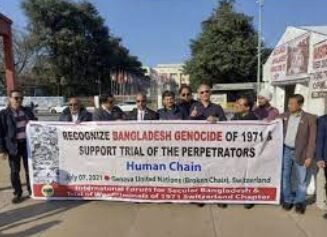Genocide of Bengalis in Bangladesh: Global Rights Activists Demand International Recognition and Justice for Victims
Rights activists demand international recognition of the 1971 genocide in Bangladesh. The event organized by GHRD discussed the issue, emphasizing the need for justice and accountability.
Rights activists are calling for international recognition of the genocide of Bengalis in Bangladesh, formerly known as East Pakistan, in 1971 by the Pakistani army. An event was organized by Global Human Rights Defence (GHRD) at the UN Human Rights Council, where panelists discussed the issue and called for justice for the victims. The GHRD chairman emphasized the need for NGOs and the UN to prioritize this issue. The event, which took place on the sidelines of the 54th session of the UN Human Rights Council, aimed to raise awareness and ensure justice for the victims of the genocide.
Various perspectives were presented by panelists, including representatives from the Organisation of Eastern Caribbean States, Belgium, and the European Union. The event attracted over 80 participants in person and many more online. During the event, GHRD Chairman Shradhanand Sital highlighted the importance of addressing and preventing such horrific crimes. He called on NGOs and members of the UN to make this issue a top priority, particularly in light of the promise made in 1945 after the Second World War to never allow such atrocities to occur again.
Dutch politician and human rights activist Harry van Bommel shared the findings of a fact-finding mission that visited Bangladesh in May 2023. He spoke directly with victims and researchers and recounted a 90-year-old woman's testimony of witnessing the killing of 43 people in her village by the Pakistani army. Van Bommel argued that the sheer amount of evidence supports the conclusion that a genocide took place in 1971. He announced plans to bring these findings to the European Parliament and other institutions to seek international recognition and raise awareness.
Sanchita Haque, the Deputy Permanent Representative of Bangladesh to the UN in Geneva, expressed the pain felt by the Bangladeshi people due to the lack of recognition by the international community. Despite the scale of the horrific crimes committed during the genocide, she noted the international community's failure to acknowledge it as a genocide. Bangladesh observes March 25th as Genocide Day and has established the Liberation War Museum to fight for recognition and justice.
Anthonie Holslag, a lecturer at the Vrije Universiteit in Amsterdam specializing in international law and genocide, provided his academic perspective on the matter. He emphasized the need for proof of intent under international law and argued that the extensive legal, social, and scientific evidence collected leaves no room for contention regarding whether or not the crimes can be classified as a genocide.
To conclude the event, GHRD Chairman Sital called for support and justice for the victims of the genocide. He reminded UN members of their duty to recognize and seek justice for the affected individuals. Highlighting the staggering number of casualties, rapes, and displacements, Chairman Sital demanded that the United Nations and its frameworks take stronger actions. This event served as a call to action, setting the stage for a campaign to ensure accountability and closure for the victims. It highlighted the urgent need for the international community and the United Nations to officially recognize the genocide after 52 years of denial, ignorance, and oversight.




